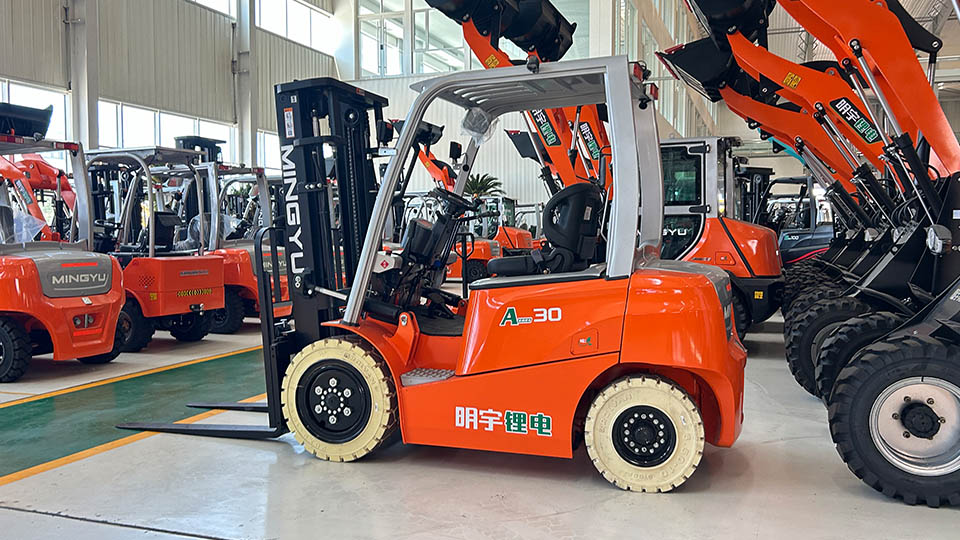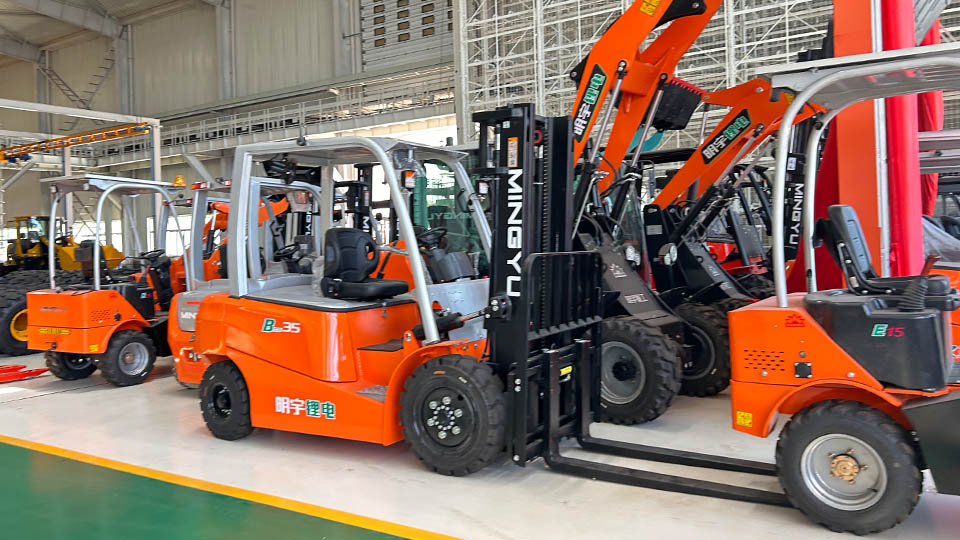
Why Your Forklift Runs on Propane and Not Gasoline: A Technical Deep Dive
In the vast landscape of material handling, forklifts are the workhorses, diligently lifting, stacking, and transporting goods across warehouses, manufacturing plants, and distribution centers. While some forklifts are electric and others diesel, a significant portion of the global fleet operates on liquefied petroleum gas (LPG), more commonly known as propane. This often leads to a common question, particularly for those familiar with gasoline-powered vehicles: "Why does the forklift I use run on propane and not gasoline?"
The answer lies in a confluence of factors encompassing environmental regulations, operational efficiency, safety considerations, maintenance advantages, and fuel economics, all tailored to the unique demands of an indoor or mixed-use industrial environment. This article will delve into the technical reasons and practical benefits that make propane the preferred fuel for many internal combustion engine (ICE) forklifts over gasoline.
1. Emissions and Indoor Air Quality: The Primary Driver
Perhaps the most compelling reason for propane's dominance in forklifts, especially those operating indoors, is its cleaner emissions profile compared to gasoline.
Combustion Byproducts: Both gasoline and propane are hydrocarbons, and their combustion produces carbon dioxide (CO 2 ), water (H 2O), and various other byproducts. However, the chemical structure of propane (primarily C
3H 8) results in a cleaner burn.
Reduced Harmful Pollutants:
Carbon Monoxide (CO): While both fuels produce CO, propane combustion typically yields significantly lower levels. CO is a colorless, odorless, and highly toxic gas that displaces oxygen in the bloodstream, leading to symptoms ranging from headaches and dizziness to unconsciousness and death. In enclosed spaces like warehouses, even small concentrations can accumulate to hazardous levels.
Nitrogen Oxides (NOx): These are a group of gases that contribute to smog and acid rain and can cause respiratory problems. Propane combustion generally produces fewer NOx emissions than gasoline.
Hydrocarbons (HCs) / Volatile Organic Compounds (VOCs): Unburned hydrocarbons are precursors to ozone formation and contribute to air pollution. Propane's simpler molecular structure leads to more complete combustion and thus fewer unburned HCs.
Particulate Matter (PM): Gasoline engines, especially older or less well-maintained ones, can emit fine particulate matter, which is harmful to respiratory health. Propane engines produce virtually no PM.Sulfur Dioxide (SO2 ): Propane, as a refined product, contains very low levels of sulfur compared to gasoline, resulting in negligible SO 2
emissions, which contribute to acid rain.

Regulatory Compliance: Environmental agencies like the Environmental Protection Agency (EPA) and the Occupational Safety and Health Administration (OSHA) impose strict limits on indoor air contaminants. Propane-powered forklifts are far more likely to meet these stringent indoor air quality standards, making them a safer and compliant choice for enclosed or semi-enclosed operations where exhaust fumes could pose a health risk to workers. Gasoline forklifts are typically relegated to outdoor-only applications where ventilation is not an issue.
2. Fuel System Design and Delivery
The way fuel is stored and delivered to the engine also presents significant differences and advantages for propane.
Pressurized Storage: Propane is stored as a liquid under pressure in robust cylinders. This means it doesn't evaporate readily, reducing evaporative emissions and fuel loss when stored. Gasoline, being volatile, constantly evaporates, especially in warm conditions, leading to emissions and fuel waste.
Liquid Withdrawal System: As detailed in previous discussions, forklift propane tanks utilize a liquid withdrawal system. Liquid propane flows from the tank to a vaporizer/converter (also known as a regulator). This component uses heat from the engine's cooling system to convert the liquid propane into a gaseous state, which is then delivered to the engine's carburetor or fuel injection system.
Advantages of Liquid Withdrawal: This system ensures a consistent and high-volume fuel supply to the engine, regardless of ambient temperature or load, ensuring reliable power output. Gasoline, while liquid-fed, relies on a more complex fuel pump system and often suffers from issues like "vapor lock" in extreme heat.
Sealed Fuel System: The entire propane fuel system – from the sealed tank to the carburetor/injectors – is typically a closed loop. This minimizes opportunities for fuel spills, leaks, and evaporative emissions, which are common concerns with gasoline tanks and refilling procedures.
Refueling Convenience and Safety: Propane tanks are swapped out rather than refilled on-site from a nozzle.
Quick Swaps: A depleted propane tank can be quickly replaced with a full one in a matter of minutes, minimizing downtime.
Reduced Spills: Tank changes, while requiring proper safety protocols, inherently carry a lower risk of fuel spills compared to pouring liquid gasoline from a pump. Spilled gasoline presents a significant fire hazard and creates slip risks.
Cleanliness: Propane refueling is a much cleaner process, avoiding the drips and fumes associated with gasoline.
3. Engine Design and Performance Characteristics
While both operate as internal combustion engines, there are subtle differences in their design and performance optimized for their respective fuels.
Higher Octane Rating: Propane has a naturally high octane rating (typically 100+), which makes it very resistant to "knocking" or "pre-ignition." This allows propane engines to be designed with higher compression ratios than comparable gasoline engines, which can lead to greater thermal efficiency and power output from a given engine size.
Smoother Combustion: Propane burns very cleanly and completely, leading to less carbon buildup on engine components like pistons, valves, and spark plugs. This contributes to smoother engine operation and reduces wear and tear over time.
Fuel Injection vs. Carburetion: Modern gasoline engines heavily rely on sophisticated electronic fuel injection (EFI) systems for precise fuel delivery and emissions control. While propane forklifts can also use EFI, many still utilize simpler carburetion systems, which are robust and cost-effective for their application, partly due to propane's gaseous state after vaporization.
Cold Starting: Propane engines generally have excellent cold-starting characteristics because the fuel is vaporized before entering the engine, ensuring a consistent mixture even in chilly conditions. Gasoline's volatility can be an issue in extreme cold.
4. Maintenance and Longevity
The cleaner-burning nature of propane translates directly into significant maintenance advantages for forklifts.
Extended Engine Life: As mentioned, propane combustion produces fewer carbon deposits, sludge, and contaminants. This means:
Cleaner Oil: Engine oil stays cleaner for longer, reducing the frequency of oil changes and filter replacements.
Reduced Wear on Components: Less carbon buildup on valves, pistons, and cylinder walls minimizes abrasive wear, extending the lifespan of critical engine components.
Fewer Spark Plug Fouling Issues: Spark plugs last longer due to cleaner combustion.

Lower Maintenance Costs: The cumulative effect of extended service intervals and reduced wear on engine components leads to lower overall maintenance costs compared to gasoline-powered counterparts. Less frequent part replacements and fewer unscheduled repairs contribute to a lower total cost of ownership.
Reliability: A cleaner engine is a more reliable engine. Propane forklifts often exhibit greater uptime due to fewer fuel-related operational issues.
5. Safety Considerations
Safety is paramount in any industrial setting, and propane offers specific advantages in this regard.
Contained System: As discussed, the sealed, pressurized propane system significantly reduces the risk of leaks and spills compared to gasoline, especially during refueling. Gasoline fumes are also highly flammable and denser than air, posing an invisible threat.
Automatic Shut-off Valves: Forklifts are often equipped with safety features that automatically shut off the propane supply in case of an engine stall, collision, or rollover. This prevents uncontrolled fuel release in emergency situations.
Reduced Fire Risk (Post-Accident): While propane is flammable, in the event of an accident that compromises the fuel system, the pressurized nature of propane means it tends to dissipate quickly as a gas rather than pooling like spilled gasoline. This can, in some scenarios, reduce the immediate fire spread risk. However, it's crucial to note that propane's flammability range is narrower than gasoline's, and its odorant (ethyl mercaptan) makes leaks more detectable.
Ventilation: While propane burns cleaner, proper ventilation is still crucial in indoor environments. However, the lower levels of toxic emissions make it a safer choice than gasoline for such settings.
6. Fuel Economics and Availability
While fuel prices fluctuate, propane often presents a compelling economic case for forklift operations.
Bulk Purchasing and Delivery: Businesses can purchase propane in bulk, often securing favorable pricing and scheduled deliveries, ensuring a consistent fuel supply.
Consistent Pricing: Compared to gasoline, which can be subject to significant daily fluctuations based on global oil markets and local taxes, propane pricing can be more stable and predictable for commercial accounts.
Infrastructure: The infrastructure for propane tank exchange and bulk delivery is well-established in industrial areas, making it a convenient and readily available fuel source.
Limitations and Considerations
While propane offers numerous advantages, it's not without its specific considerations:
Energy Density: Propane has a slightly lower energy density by volume than gasoline. This means a tank of propane will typically provide less range or runtime than a similar volume of gasoline, necessitating more frequent tank changes.
Tank Handling: Operators must be trained in the safe handling and changing of heavy propane tanks, including personal protective equipment (PPE) like gloves.
Temperature Sensitivity: While the vaporizer compensates, extremely low temperatures can affect the pressure within the tank if the forklift is left unused for extended periods in unheated environments, potentially impacting initial startup.
Outdoor Performance (Extreme Cold): In very cold outdoor conditions, diesel might be preferred for heavy-duty forklifts due to its robust cold-weather performance and higher torque output for extremely heavy loads.
Conclusion
The widespread adoption of propane as a forklift fuel is a testament to its multifaceted advantages over gasoline in industrial settings. Its cleaner emissions profile directly addresses critical indoor air quality and worker safety concerns. The sealed, liquid-withdrawal fuel system offers superior reliability, cleaner operation, and faster refueling. Coupled with maintenance benefits from cleaner combustion and a generally favorable economic profile, propane stands out as a highly efficient, safer, and environmentally responsible choice for powering a significant portion of the world's forklift fleet. While alternative fuels and electric models continue to advance, propane will likely remain a dominant force in the material handling industry for the foreseeable future, providing the power and precision necessary to keep goods moving efficiently and safely.
Name: selena
Mobile:+86-13176910558
Tel:+86-0535-2090977
Whatsapp:8613181602336
Email:vip@mingyuforklift.com
Add:Xiaqiu Town, Laizhou, Yantai City, Shandong Province, China